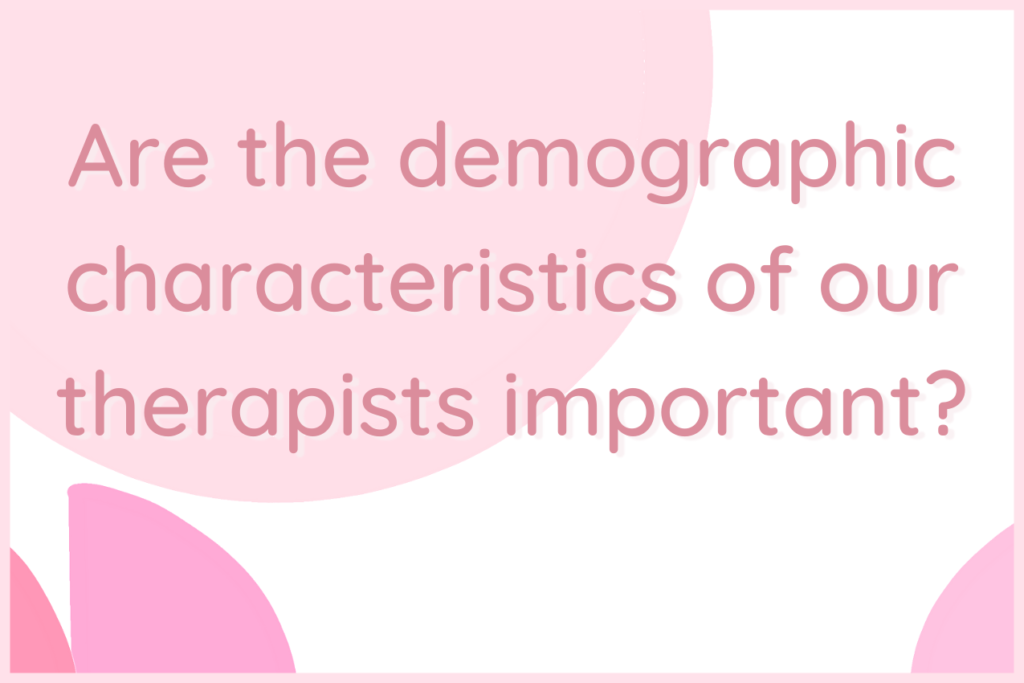Are the demographic characteristics of our therapists important?
by Andres Carrion | July 2021
Life’s challenges can be overwhelming; everyone deserves a space to feel heard and supported. At Roamers Therapy, we provide trauma-informed, culturally sensitive, LGBTQIA+ affirming, and evidence-based environments to help you heal, grow, and navigate your mental well-being journey. As your psychotherapist, we are here to guide you every step of the way.

Many times, people who are new to therapy will ask whether the demographic characteristics (e.g., gender, race/ethnicity, age, sexual orientation, etc.) of their therapists matters. That is, is therapy more or less effective based on the therapist’s demographic characteristics? The short answer is potentially. Research suggests that the biggest predictor for the effectiveness of therapy is how connected one feels with their therapist. However, like most things in therapy, the actual answer is much more complex.
People often go into therapy with specific criteria they want their therapist to meet or identities they want them to hold – more often than not, clients typically seek therapists who hold similar identities and demographic characteristics as them. For instance, female clients may prefer to work with female therapists, people of color may prefer to work with therapists of color, and queer clients may prefer to work with queer therapists. This is because of several reasons. Some people may feel that therapists who are like them may understand them better and will, in turn, be better therapists. Other clients prefer to work with therapists of similar backgrounds out of comfort; they may feel like it would be easier to talk to therapists who understand the nuances and colloquialisms of various identities. There are also clients who seek therapists who are like them out of safety, such as people of color who prefer to work with therapists of color because of the inherent power dynamics that would exist while working with a white therapist.
In the same way that there are people who seek therapists who are similar to them, there are also people who seek therapists who are different from them. This may be because someone feels more comfortable or even safer discussing their experiences with someone of a different background. Some people may believe that people who are different from them may be better therapists overall because of representation (or other personal beliefs). For example, most therapists are women, so some people may feel that female therapists are more competent than male ones. There are also people who do not care about the demographic characteristics of their therapists.
Overall, the demographic characteristics of your therapist matters to the extent that they matter to you. Therapists of all backgrounds are competent and well-equipped to support you and your experiences. However, if you do not feel safe or comfortable with someone, know that it is your therapy, and your comfort and safety is important. It may be beneficial to ask yourself why and whether it would do more harm than good to enter into a therapeutic relationship with this person. It’s also important to consider that just because someone does (or doesn’t) share similar identities as you, it does not mean that they are more culturally competent and will understand you better.
While our physical offices are located in South Loop and Lakeview neighborhoods in Chicago, Illinois for in-person sessions, we also welcome and serve clients for online therapy from anywhere in Illinois and Washington, D.C. Clients from the Chicagoland area may choose in-office or online therapy and usually commute from surrounding areas such as River North, West Loop, Gold Coast, Old Town, Lincoln Park, Lake View, Rogers Park, Logan Square, Pilsen, Bridgeport, Little Village, Bronzeville, South Shore, Hyde Park, Back of the Yards, Wicker Park, Bucktown and many more.
At Roamers Therapy, our psychotherapists are here to support you through anxiety, depression, trauma and relationship issues, race-ethnicity issues, LGBTQIA+ issues, ADHD, Autism, or any challenges you encounter. Our psychotherapists are trained in Cognitive Behavioral Therapy, Dialectical Behavioral Therapy, Psychodynamic Therapy, Acceptance, and Commitment Therapy, Person-Centered Therapy, and Gottman Therapy.
Whether you’re seeking guidance on a specific issue or need help navigating difficult emotions, we’re ready to assist you every step of the way.
Contact us today to learn more about our services and schedule a session with our mental health professionals to begin your healing journey. To get started with therapy, visit our booking page.
First, decide if you’ll be paying out-of-pocket or using insurance. If you’re a self-pay client, you can book directly through the “Book Now” page or fill out the “Self-Pay/Out-of-network Inquiry Form.” If you’re using insurance, fill out the “Insurance Verification Form” to receive details about your costs and availability. Please let us know your preferred therapist. If your preferred therapist isn’t available, you can join the waitlist by emailing us. Once your appointment is confirmed, you’ll receive intake documents to complete before your first session.
This page is also part of the Roamers Therapy Glossary; a collection of mental-health related definitions that are written by our therapists.
While our offices are currently located at the South Loop neighborhood of Downtown Chicago, Illinois, we also welcome and serve clients for online therapy from anywhere in Illinois and Washington, D.C. Clients from the Chicagoland area may choose in-office or online therapy and usually commute from surrounding areas such as River North, West Loop, Gold Coast, Old Town, Lincoln Park, Lake View, Rogers Park, Logan Square, Pilsen, Bridgeport, Little Village, Bronzeville, South Shore, Hyde Park, Back of the Yards, Wicker Park, Bucktown and many more. You can visit our contact page to access detailed information on our office location.
